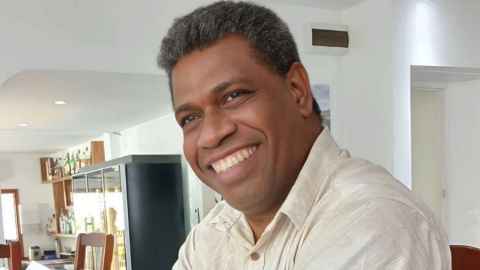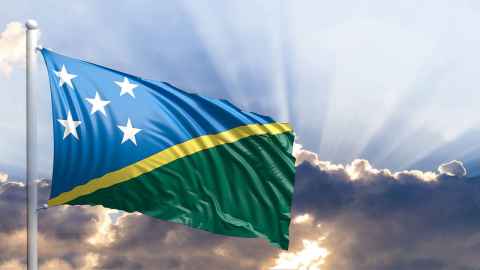Celebrating Solomon Islands Pidgin Language Week, 23-29 November
21 November 2025
The theme of Solomon Islands Pidgin Language Week is "Protektim langguis an kalsa blong yumi. Protect our language and culture".

As New Zealand celebrates Solomon Islands Pidgin Language Week, Associate Professor Gordon Nanau, Deputy Head of Te Wānanga o Waipapa at the University of Auckland, reflects on the power of language and the past 12 months in his new role.
Born in Tumbosa, Tathimboko on Guadalcanal, Nanau comes from the Nekama tribe and a family deeply committed to education. His late father, John Nanau, was a respected primary school teacher who revived a local school after World War II, in a settlement called Mendingi. He rallied young people to establish Kulu Primary School, which later became Kulu Primary and Community High School, under the Guadalcanal Education Authority.
“My father believed education opened doors,” Nanau says. “He persevered despite land disputes and scarce resources. That legacy shaped my own journey.”
Language as a bridge
Solomon Islands is home to around 78 distinct languages, making communication across islands historically challenging. Nanau is fluent in six languages, including Lengo from Guadalcanal, Solomon Islands Pidgin and English.
The rise of Solomon Islands Pidgin reflects social change, with intermarriage and mobility having made it essential for families who speak different languages.
“When I was a little boy, Pidgin was still a foreign language in my village and was only used when one went to Honiara, the capital town, and interacted with people from other islands,” Nanau recalls.
“It was never a language spoken by children. That’s totally changed today, most of the population speaks Solomon Islands Pidgin together with their own mother tongues.”
Intermarriage between different groups of people has increased over the past decades, with Pidgin becoming a language of necessity.
“My nephews, nieces and daughters’ first language is Pidgin, because their parents do not speak the same local language.”
Academic journey and expertise
Nanau's academic path began at the University of the South Pacific (USP), where he completed his undergraduate and postgraduate studies before earning a PhD in International Development from the University of East Anglia, UK. He spent 14 years as a senior lecturer at USP, shaping research on governance, development and cultural resilience across the Pacific.
His expertise also covers leadership, electoral systems, decentralisation, rural livelihoods, and Pacific epistemologies, with a strong focus on social and political change in Melanesia.
“Understanding governance and development in the Pacific requires Indigenous perspectives,” Nanau explains. “My research brings Melanesian voices into global conversations about leadership and resilience.”
At the University of Auckland, this knowledge is vital.
“Pacific Studies must reflect the full diversity of Oceania,” he says. “My role ensures Melanesian and Micronesian perspectives are part of the curriculum and research agenda. This matters for our students and for Aotearoa’s engagement with the wider Pacific.”
My father believed education opened doors. He persevered despite land disputes and scarce resources. That legacy shaped my own journey.

Global perspective
Nanau’s academic journey also included time in Charlestown, US, during an exchange year when he first started out. He learned the value of perseverance through a flatmate’s dedication to mastering English.
“He spent hours watching American TV to learn English. I’d come home in the early hours of the morning and he would still be there. By the end of the year when he went back to Japan, he was more fluent than I was,” Nanau laughs.
His academic career has taken him and his family to different parts of the world. His eldest daughter lives overseas and visits often.
“We lived in Norwich, UK for more than three years and Suva Fiji for 15 years until 2024. Moving to a new country and place is always a struggle and I think after a year, my family have now settled comfortably in Onehunga, Aukland.
“New Zealand is a beautiful island country, and we are grateful for the opportunity to live and work here. My younger daughter is finishing off her high school education this year and is looking forward to going to university.”
Nanau says he’s especially looking forward to visiting home this summer, it will be an opportunity to reconnect with family, unwind and also be able to speak his many heritage languages.
Current research
Nanau is leading and collaborating on three major projects:
- Oceanic Diplomacy: Reasserting Indigenous Pathways Through the Contemporary Pacific, a book involving 16 researchers across Oceania and Aotearoa
- Samting i narakaen: Social Change in Fiji, Papua New Guinea and Solomon Islands. A Marsden-funded collaboration with Massey University, Waikato and Pacific institutions.
- A new University of Auckland-supported project with colleagues from Pacific Studies and Anthropology.
"These projects explore how Pacific communities navigate change while holding onto cultural values,” Nanau says. “They highlight Indigenous knowledge as a foundation for diplomacy, governance, and social resilience.”
Fun facts
- Solomon Islands is a large Ocean state, second only to Papua New Guinea in landmass among Pacific nations.
- Solomon Islands hosts the world’s largest lagoon, longest freshwater lake, and biggest coral colony.
- It’s a mini version of the Pacific; home to Melanesians, Micronesians, and Polynesians, with both hierarchical and egalitarian societies, as well as patrilineal and matrilineal systems.
- The Solomon Islands diaspora in Aotearoa is estimated to number from 800 to 2,000, fluctuating with the Recognised Seasonal Employer (RSE) scheme.
- A popular dish in the Solomon Islands is Poi, a traditional staple made from fermented taro root that is mashed into a smooth paste and often served with fish or pork. It’s considered the national dish and is deeply tied to cultural heritage.